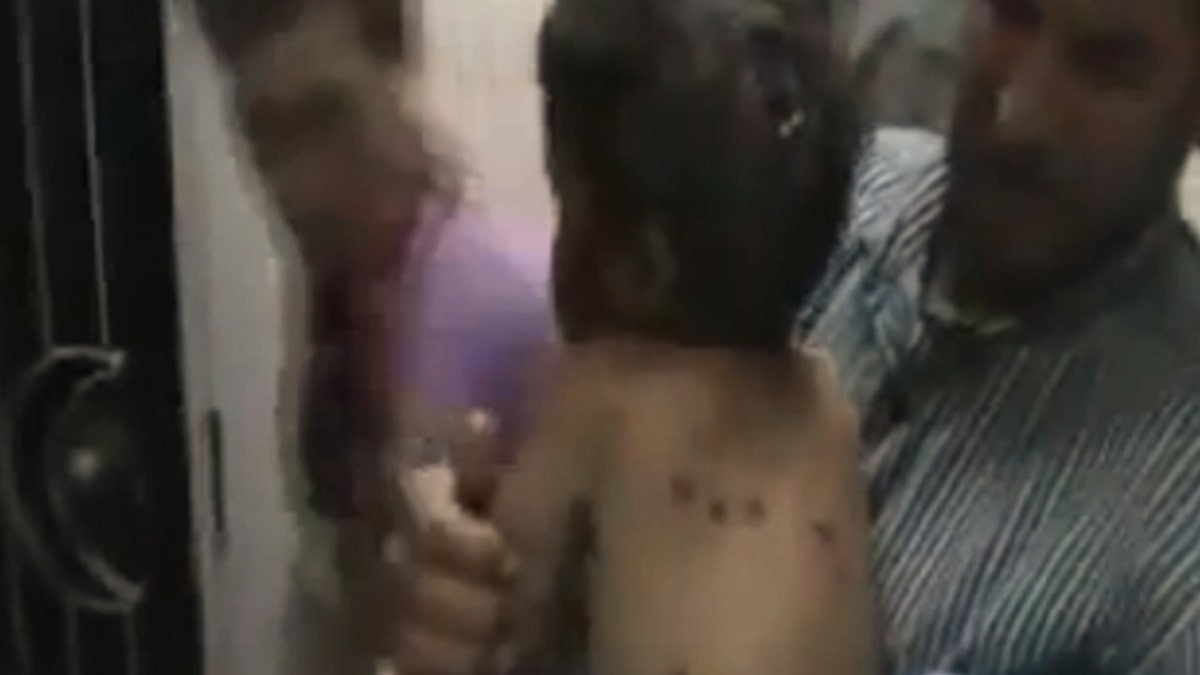
This image made from amateur video released by Shaam News Network and accessed Saturday, May 26, 2012 purports to show an injured child in Houla, Syria. (AP Photo/Shaam News Network via AP video)
BEIRUT – Special envoy Kofi Annan said Monday he was horrified by a gruesome weekend massacre that killed more than 100 people in Syria, and called on "every individual with a gun" to lay down arms and stop the killing.
Annan arrived in Damascus Monday for talks with Syrian President Bashar Assad and other senior officials.
"I have come to Syria at a critical moment in this crisis," Annan said as he arrived in Damascus on Monday. "I am personally shocked and horrified by the tragic incident in Houla."
He called on all sides of the conflict to end the bloodshed.
"This message of peace is ... for everyone, for every individual with a gun," he said.
The mass killings Friday in Houla, a collection of villages in the central province of Homs, prompted sweeping international criticism of the Syrian regime, although differences emerged from world powers over whether his forces were exclusively to blame.
Syrian troops shelled several neighborhoods in Hama until the early hours of Monday, killing at least 24 people, the Britain-based Syrian Observatory for Human Rights and the Local Coordination Committees activist group said. Amateur videos showed a makeshift hospital where several people lay on the floor either dead or wounded. Further details were not immediately clear.
The violence comes at a time of deep concern over the conflict in Syria. The Houla massacre was one of the deadliest single days of the country's uprising, which is in its 15th month.
Syria has strongly denied allegations that its forces carried out the killings, but the U.N. Security Council after an emergency session Sunday condemned government forces for shelling residential areas.
Human Rights Watch urged a swift investigation.
"There's no way a Syrian military commission can credibly investigate this horrendous crime when so much evidence suggests pro-government forces were responsible," said Sarah Leah Whitson, Middle East and North Africa director at the New York-based group. "Annan should insist that Syria grant access to the U.N. commission of inquiry to investigate this and other grave crimes."
The brutality of the killings became clear in amateur videos posted online that showed scores of bodies, many of them young children, in neat rows and covered with blood and deep wounds. A later video showed the bodies, wrapped in white sheets, being placed in a sprawling mass grave.
The United Nations estimates that 9,000 people have been killed since the uprising began in March 2011, but hundreds more have been killed since the U.N. provided that figure.
The Security Council issued a press statement Sunday that "condemned in the strongest possible terms" the killings in Houla. It blamed Syrian forces for artillery and tank shelling of residential areas. It also condemned the killings of civilians "by shooting at close range and by severe physical abuse," but avoided saying who was responsible for these attacks.
The council's statement said the "outrageous use of force" against civilians violated international law and Syrian government commitments under previous U.N. resolutions to stop all violence, including the use of heavy weapons in populated areas. It said "those responsible for acts of violence must be held accountable," and asked the U.N. observer mission in Syria and Secretary-General Ban Ki-moon to investigate the attacks and report back to the council.
Britain and France had proposed issuing a press statement condemning the attack on civilians and pointing the finger at the Syrian government for Friday's massacre. But Russia called for an emergency council meeting saying it first wanted a briefing by Mood, the head of the unarmed U.N. observer mission.
The massacre in Houla cast fresh doubts on the ability of an international peace plan put forward by U.N.-Arab League envoy Kofi Annan to end Syria's crisis, which is in its 15th month.
Mood told the Security Council that U.N. observers at the scene now estimate 108 people were killed in Houla, U.N. peacekeeping chief Herve Ladsous told reporters outside the council chamber. The U.N. counted 49 children and 34 women among the dead.
Activists from the Houla area said the army pounded the villages with artillery and clashed with local rebels after protests Friday. Some activists said pro-regime thugs later stormed the area, doing the bulk of the killing by gunning down men in the streets and stabbing women and children in their homes.
The Syrian government rejected that narrative Sunday, painting a vastly different picture.
Speaking to reporters in Damascus, Foreign Ministry spokesman Jihad Makdissi said Syrian security forces were in their local bases Friday when they were attacked by "hundreds of heavily armed gunmen" firing mortars, heavy machine guns and anti-tank missiles, staring a nine-hour battle that killed three soldiers and wounded 16.
The soldiers fought back, but didn't leave their bases, he said.
"No Syrian tank or artillery entered this place where the massacres were committed," he said. "The security forces did not leave their places because they were in a state of self-defense."
He blamed the gunmen for what he called a "terrorist massacre" in Houla and accused the media, Western officials and others of spinning a "tsunami of lies" to justify foreign intervention in Syria.
Makdissi did not provide videos or other evidence to support his version of events, nor did he give a death toll. He said the government had formed a committee to investigate and share its findings with Annan, who is due to visit Damascus in the coming days.
Throughout the uprising, the government has deployed snipers, troops and thugs to quash protests and shelled opposition areas.
